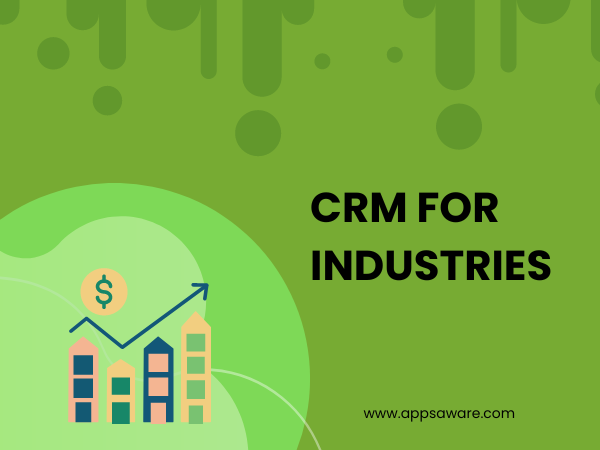In today’s fast-paced and competitive business world, it’s essential to have streamlined operations that can help your organization stay ahead of the game. One of the most effective ways to achieve this is by implementing a customer relationship management (CRM) system tailored to your industry requirements.
CRM for industries offers numerous benefits, including improved efficiency, enhanced customer relationships, and increased sales. By leveraging the power of CRM, businesses can gain valuable insights into their customer base, optimize sales processes, and improve overall performance metrics.

Table of Contents
Key Takeaways
- CRM for industries can help streamline business operations.
- Implementing a CRM system can improve efficiency, enhance customer relationships, and increase sales.
What is CRM?
CRM stands for Customer Relationship Management. It is a technology-based strategy that allows businesses to manage their interactions with customers and potential customers. The goal of CRM is to improve customer satisfaction and loyalty while streamlining business operations.
CRM involves the use of software platforms to collect, store, and analyze customer data, including contact information, purchase history, and feedback. This data is used to create a comprehensive profile of each customer, enabling businesses to personalize their interactions and offer targeted marketing campaigns.
CRM is not limited to customer-facing activities; it also encompasses internal business processes, such as sales forecasting, inventory management, and performance tracking. By integrating all areas of business operations, CRM helps companies make more informed decisions and improve overall efficiency.
Overall, CRM is a powerful tool that can help businesses of all sizes and industries streamline their operations and build stronger relationships with their customers.
Benefits of CRM for Industries
Implementing a Customer Relationship Management (CRM) system can revolutionize business operations, enhancing customer relationships, improving efficiency and increasing sales. Let’s explore the major advantages of implementing CRM in various industries:
Improved Efficiency
CRM helps businesses streamline their internal processes by automating tasks such as data entry, lead tracking, and customer support. This saves time and resources, allowing employees to focus on more important tasks.
Enhanced Customer Relationships
CRM enables companies to build stronger relationships with their customers by providing a 360-degree view of their interactions and history. This helps businesses personalize their marketing and communication efforts, resulting in increased customer satisfaction and loyalty.
Increased Sales
By tracking leads and analyzing sales data, CRM helps businesses identify their most profitable customers and target them with personalized offers. This results in increased sales and revenue.
Overall, implementing a CRM system can bring numerous benefits to different industries, improving efficiency, enhancing customer relationships, and increasing sales. By optimizing their operations with CRM, businesses can stay competitive and deliver better value to their customers.
Key Features of CRM for Industries
Customer Relationship Management (CRM) software offers various features to cater to industry-specific needs. Listed below are some of the key features of CRM for industries:
| Feature | Description |
|---|---|
| Customizable Pipelines | CRM for industries provides customizable pipelines that enable businesses to manage their sales process more efficiently. With pipelines, businesses can categorize their prospects based on their stage in the sales cycle and monitor their progress. |
| Contact Management | CRM software allows businesses to store and manage their contacts in one place. This feature enables businesses to keep track of their interactions with their customers and prospects and allows them to provide personalized experiences to their customers. |
| Data Analytics | CRM provides businesses with insights on customer behavior and sales performance. With data analytics, businesses can identify patterns and trends and adjust their strategies accordingly. |
Other features of CRM for industries may include:
- Marketing Automation
- Lead Management
- Campaign Management
- Inventory Management
- Customer Support
By leveraging these key features, businesses can streamline their operations, improve their customer relationships, and drive growth.
Implementing CRM in Retail Industry
The advent of technology has revolutionized the retail industry, providing companies with new ways to interact with customers and streamline operations. Customer relationship management (CRM) is among the leading solutions that have gained significant traction in the retail industry in recent years. Through the implementation of CRM, businesses can improve their customer service, boost sales, and gain better insight into consumer behavior.
As the retail industry continues to become more competitive, providing a top-notch customer experience has become increasingly important. CRM can help businesses achieve this by providing real-time insights into customer needs and behaviors.
| CRM Features | Benefits for Retailers |
|---|---|
| Customer Segmentation | Enables personalized messaging, targeted promotions and product recommendations, increasing customer loyalty and lifetime value. |
| Inventory Management | Enables retailers to reduce costs by managing inventory levels, minimizing stockouts and overstocks, and improving supply chain efficiency. |
| Sales Tracking | Enables sales teams to manage leads, track sales performance, and provide customized support for customers. |
With CRM, retailers can seamlessly manage their inventory, keep track of customer orders, and analyze sales data to make informed business decisions. By utilizing data analytics, businesses can identify patterns in customer behavior and adjust their strategies accordingly. Additionally, CRM can be integrated with other software solutions, such as online ordering systems, to streamline the customer journey.
CRM can also enable retailers to better understand their customers’ preferences and purchase history. This information can be used to personalize marketing campaigns and promotions, leading to increased customer satisfaction and loyalty. Additionally, CRM can be used to track customer interactions across various channels, such as social media, email, and phone, ensuring consistent and high-quality service.
Key Takeaways
- CRMs can provide real-time insights into customer needs and behaviors.
- CRM can help reduce cost by managing inventory levels, minimizing stockouts and overstocks.
- CRM can enable sales teams to manage leads, track sales performance, and customize support.
In conclusion, implementing CRM is essential for businesses in the retail industry to enhance customer experience, boost sales, and streamline operations. It is important to select a CRM solution that is tailored to the business’s needs and integrates well with other software solutions. With CRM, retailers can stay ahead of the competition and build lasting relationships with their customers.
CRM Solutions for Manufacturing Sector
The manufacturing sector presents unique challenges that require specialized CRM solutions to optimize operations and enhance customer relationships. With efficient management of supply chains, lead tracking, and customer support, CRM can drive growth and profitability for manufacturing businesses.
Supply Chain Management
The manufacturing industry is heavily reliant on a complex supply chain, making supply chain management a critical aspect of the business. CRM offers customizable workflows and automations that streamline inventory management, production planning, and procurement. By centralizing supply chain processes, manufacturers can optimize operations, minimize waste, and reduce costs.
Lead Tracking
Manufacturers face a competitive market that demands quick response times to inquiries, quotes, and orders. CRM provides lead tracking capabilities that enable manufacturers to respond swiftly to customer needs, manage sales pipelines, and track sales performance. Manufacturers can also use CRM to analyze data and trends to identify opportunities for growth and mitigate risks.
Customer Support
Customer satisfaction is paramount in the manufacturing industry, and CRM can help manufacturers deliver exceptional customer support. With CRM, manufacturers can manage and track customer interactions, handle service requests, and monitor product warranties and returns. CRM also offers robust reporting and analytics that provide insights into customer behavior, enabling manufacturers to tailor their services and products to meet customer needs.
CRM for Healthcare Industry
The healthcare industry faces unique challenges when it comes to managing patient information and providing high-quality care. These challenges can be effectively addressed by implementing a robust CRM system.
One of the key benefits of CRM in healthcare is optimizing patient management. By keeping track of patient data, medical professionals can provide personalized care, track patient history, and make informed decisions, all while maintaining compliance with HIPAA regulations.
CRM can also streamline appointment scheduling for healthcare providers, helping to reduce no-shows and increase patient satisfaction. Automated appointment reminders and easy rescheduling options improve communication and make it simpler for patients to access the care they need.
Moreover, CRM systems provide a platform for efficient communication between medical professionals and patients. Secure messaging and telemedicine options can help healthcare providers connect with patients and provide timely care, all while minimizing in-person contact.
By implementing CRM, healthcare providers can benefit from better patient management, streamlined appointment scheduling, and improved communication, ultimately leading to better patient outcomes.
CRM in Financial Services
Financial services can greatly benefit from implementing CRM solutions, which offer a range of features to streamline client management processes. CRM helps financial institutions to analyze customer data and tailor financial products and services to meet their specific needs. It also offers a centralized database to store and manage client information securely and efficiently, improving customer experience and satisfaction.
Benefits of CRM in Financial Services
With CRM, financial institutions can:
- Improve client onboarding efficiency by automating document submission and verification processes.
- Manage client portfolios more effectively by tracking clients’ investment history, personal data, and communication history.
- Enhance customer satisfaction by providing personalized financial advice and tailored services based on customer data.
- Automate marketing campaigns to promote financial products or services to targeted customers.
- Optimize communication with customers through various channels, such as email, mobile, and social media.
Choosing the Right CRM for Financial Services
When selecting a CRM solution for financial services, consider the following factors:
- Scalability: Ensure that the CRM system can scale with business growth and handle increasing amounts of client data.
- Integration capabilities: Choose a CRM solution that integrates well with other financial software and systems, such as accounting and transaction management tools.
- User-friendliness: Look for a CRM system that is easy to use and offers intuitive navigation and a simple user interface.
CRM for Hospitality and Tourism
The hospitality and tourism industry thrives on providing excellent customer service and creating unforgettable experiences for guests. Utilizing a CRM solution can assist in achieving these goals while streamlining operations for businesses in this sector.
A CRM system can facilitate effective bookings management, allowing businesses to keep track of reservations, cancellations, and room availability. It can also assist in gathering customer information to personalize marketing campaigns and enhance guest satisfaction.
| CRM Benefits for Hospitality and Tourism |
|---|
| Efficient bookings management |
| Personalized marketing |
| Guest satisfaction |
CRM can also support the management of loyalty programs, allowing businesses to reward frequent customers and further strengthen their relationships. It can also aid in managing feedback and complaints, enabling businesses to address concerns promptly and effectively.
Implementing a CRM solution in the hospitality and tourism industry can lead to increased efficiency, better customer experiences, and ultimately, higher revenue. It can help businesses stay ahead of the competition and deliver exceptional results.
CRM Solutions for Nonprofit Organizations
Nonprofit organizations require a specialized CRM solution to manage their unique donor management, volunteer coordination, and fundraising requirements. A CRM system can assist in keeping track of donors’ preferences and donations, volunteer schedules and tasks, and other essential functions. Below are some of the key benefits of implementing CRM in nonprofit organizations:
| Benefits of CRM for Nonprofits |
|---|
| 1. Effective Donor Management |
| The ability to track donor giving, engagement, and communication preferences enables nonprofits to personalize their communication and recognize their donations appropriately. |
| 2. Efficient Volunteer Coordination |
| Nonprofits can manage their volunteer schedules, tasks, and communication with ease through CRM, ensuring they are utilizing their volunteers effectively. |
| 3. Streamlined Fundraising Process |
| CRM can help nonprofits streamline their fundraising activities by tracking donations, automating gift acknowledgments, and integrating with online donation platforms, making the entire process seamless and hassle-free. |
Choosing the right CRM solution is crucial for nonprofits. Factors to consider include scalability, integration capabilities, and user-friendliness. A CRM system that can grow with the organization, integrate with other software, and is easy to use, will provide the best value for nonprofits.
Choosing the Right CRM for Your Industry
When it comes to selecting the right CRM for your industry, there are several factors you need to consider. These include scalability, integration capabilities, user-friendliness, and industry-specific features.
Scalability is crucial to ensure that the CRM software can support your growing business needs. Look for a solution that can accommodate increased data storage, user accounts, and workflows without compromising performance.
Integrating the CRM software with your existing business systems can enhance productivity and streamline processes. Therefore, opt for a CRM solution that offers seamless integration with other software, such as accounting or marketing automation tools.
User-friendliness is another essential consideration, as it can affect the adoption and utilization of the software. An intuitive and easy-to-navigate interface can encourage more users to engage with the CRM, resulting in more accurate and up-to-date data.
Industry-specific features are necessary to cater to the unique needs of your business. For instance, if you are in the manufacturing sector, look for a CRM that offers advanced supply chain management and inventory tracking functionalities. Similarly, if you are in the healthcare industry, opt for a CRM that can manage patient information and schedule appointments effectively.
Ultimately, choosing the right CRM for your industry depends on your specific requirements and preferences. Consider evaluating multiple options and consulting with the CRM vendor to ensure that the solution aligns with your business goals.
Conclusion
In conclusion, CRM is a powerful tool that can help streamline business operations across various industries. By implementing CRM, businesses can improve efficiency, enhance customer relationships, and increase sales.
While the benefits of CRM are widely recognized, it is essential to choose the right CRM solution that caters to specific industry requirements. Factors like scalability, integration capabilities, and user-friendliness should be considered before selecting a CRM system.
Overall, CRM for industries is crucial for modern businesses to stay competitive and achieve sustainable growth. By integrating CRM into their operations, businesses can gain a competitive edge, optimize their processes, and ultimately deliver a better customer experience.
FAQ
Q: What is CRM?
A: CRM stands for Customer Relationship Management. It is a technology and strategy that businesses use to manage and analyze customer interactions and data. CRM helps businesses build stronger relationships with customers, streamline operations, and improve sales and customer satisfaction.
Q: What are the benefits of CRM for industries?
A: Implementing CRM in industries offers several advantages. It improves efficiency by centralizing customer data, streamlines sales processes, enhances customer relationships through personalized interactions, increases sales through targeted marketing, and provides valuable insights through data analytics.
Q: What are the key features of CRM for industries?
A: CRM offers various key features tailored to industry-specific needs. These include customizable pipelines to manage sales processes, contact management to track customer interactions, data analytics for actionable insights, task automation to increase efficiency, and integrations with other business tools.
Q: How can CRM be implemented in the retail industry?
A: CRM can be effectively utilized in the retail industry to improve customer experience, optimize inventory management, and track sales. It enables personalized marketing efforts, streamlines customer support, and provides real-time insights into customer preferences and behaviors.
Q: How can CRM solutions benefit the manufacturing sector?
A: The manufacturing sector faces unique challenges that CRM solutions can address. CRM helps manage supply chains, track leads, optimize production processes, and provide efficient customer support. It improves collaboration among teams, enhances customer satisfaction, and streamlines operations.
Q: How can CRM revolutionize the healthcare industry?
A: CRM can optimize patient management, appointment scheduling, and communication between medical professionals and patients in the healthcare industry. It improves patient outcomes, streamlines administrative tasks, and enables personalized care through better access to patient data.
Q: What role does CRM play in financial services?
A: CRM plays a crucial role in the financial services sector by streamlining client onboarding processes, managing portfolios, and improving customer satisfaction. It helps financial institutions track and analyze customer data, deliver personalized financial advice, and enhance overall client experience.
Q: How can CRM benefit the hospitality and tourism industry?
A: CRM offers numerous benefits to the hospitality and tourism industry. It enables efficient management of bookings and reservations, facilitates personalized marketing campaigns, and enhances guest satisfaction by providing tailored experiences. CRM also allows businesses to track and analyze customer preferences for targeted offerings.
Q: What are CRM solutions for nonprofit organizations?
A: CRM solutions can support nonprofit organizations in donor management, volunteer coordination, and fundraising efforts. CRM helps nonprofits build and nurture relationships with donors, track fundraising campaigns, manage volunteer engagements, and improve overall organizational efficiency.
Q: How do I choose the right CRM for my industry?
A: When choosing a CRM solution for your industry, consider factors like scalability, integration capabilities, user-friendliness, and industry-specific features. Assess your business needs and seek a CRM that aligns with your objectives and can effectively address your industry’s requirements.
























